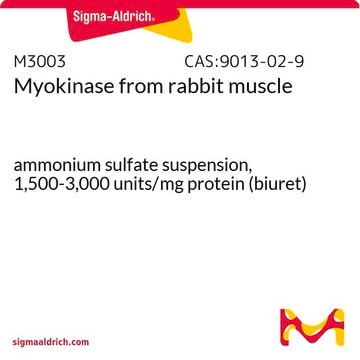N2635
Nucleoside 5′-Diphosphate Kinase from bovine liver
buffered aqueous glycerol solution, ≥1,000 units/mg protein (biuret)
Synonym(s):
NDK, UDPkinase, nonmetastatic23(NM23), uridine diphosphate kinase, ATP:nucleoside diphosphate phosphotransferase, NDPK
About This Item
Recommended Products
biological source
bovine liver
Quality Level
form
buffered aqueous glycerol solution
specific activity
≥1,000 units/mg protein (biuret)
storage condition
(Tightly closed)
technique(s)
activity assay: suitable
foreign activity
lactic dehydrogenase, myokinase, β-NADH oxidase, nucleoside monophosphokinase and ATPase ≤0.1%
storage temp.
2-8°C
General description
Nucleoside 5′-Diphosphate Kinase (NDK) is a ubiquitous housekeeping enzyme. Nucleoside Diphosphate Kinase exists in two isoforms in eukaryotic cells, NDK-A and NDK-B. These enzymes are found expressed both in the mitochondria and the cytoplasm.
Application
- nucleoside diphosphate kinase (NDPK) assays
- coupled NDPK-luciferase assay to determine the amounts of Ras-bound guanosine triphosphate (GTP)
- non-metastatic protein 23 (NM23) growth stimulation assay
- in a study to assess inhibition of type I Fc epsilon receptor mediated Ca2+ influx and mediator secretion in rat mucosal mast cells
- in a study to investigate protein synthesis in rabbit reticulocytes
Biochem/physiol Actions
Unit Definition
antibody
enzyme
related product
substrate
Storage Class Code
10 - Combustible liquids
WGK
WGK 3
Flash Point(F)
Not applicable
Flash Point(C)
Not applicable
Certificates of Analysis (COA)
Search for Certificates of Analysis (COA) by entering the products Lot/Batch Number. Lot and Batch Numbers can be found on a product’s label following the words ‘Lot’ or ‘Batch’.
Already Own This Product?
Find documentation for the products that you have recently purchased in the Document Library.
Customers Also Viewed
Our team of scientists has experience in all areas of research including Life Science, Material Science, Chemical Synthesis, Chromatography, Analytical and many others.
Contact Technical Service







